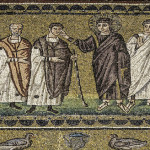We run our website the way we wished the whole internet worked: we provide high quality original content with no ads. We are funded solely by your direct support. Please consider supporting this project.
Six Theses of the Warfare Worldview
The trinitarian warfare worldview seeks to reconcile our experience of radical evil with the conviction that reality is created and sustained by an all-loving, all-powerful God. Six principles form the foundation for this view. These principles are based on Scripture’s account of God’s battle with Satan as well as our experience with the war-zone reflected in the world around us.
1. Love Requires Freedom
By definition, love must be freely chosen. We are able to program computers to obey our commands perfectly, but we don’t consider them “loving.” They lack the capacity for love because they have no choice but to do what we say. Humans would be in the same category as computers if God merely “programmed” our actions. In order for creatures to be loving, they must have the freedom to do otherwise.
2. Freedom Implies Risk
The freedom to choose or reject love constitutes a risk for God. Creatures may make choices that oppose his will for their lives and the lives of others. This risk is illustrated throughout Scripture, beginning with the Garden of Eden. Many of us have experienced the painful consequences of misused freedom in our own lives. God considered love to be well worth the risk inherent in giving his creatures freedom.
3. Risk Entails Moral Responsibility
God’s creatures are held responsible for how they use their freedom. We don’t hold computers responsible when they fail because their failure is ultimately the responsibility of their programmers. They could not do other than what they were programmed to do. Because we are free to choose or reject love, we can be held accountable for how our choices affect those around us.
4. Moral Responsibility is Proportionate to the Potential to Influence
The potential a creature has for love is proportionate to the creature’s potential for evil. The greater the creature’s potential for love, the greater risk their freedom entails, for they may choose to use their potential for evil instead. Greater potential also entails greater responsibility for how the potential is used.
5. Power to Influence is Irrevocable
Genuine freedom must be irrevocable. If it can be revoked, creatures cannot be held responsible for their use of it, nor can they fully realize their potential for love. Within the parameters of the freedom God gives creatures, God must tolerate evil. Since God is omnipotent, he is able to accomplish his will within these parameters without compromising his own integrity or limiting the potential of his creatures by revoking their freedom.
6. Power to Influence is Finite
God’s creatures are finite. Although their freedom cannot be revoked, it can be thought of as “probational.” The scope and duration of their freedom is conditioned by many variables and ultimately determined by God’s will. The warfare between God and creatures who choose to use their freedom for evil is not eternal. Christ will vanquish his enemies in the end and creatures will be completely free to participate in the triune love of God at last.
Category: General
Tags: Spiritual Warfare, Warfare Worldview
Topics: Spiritual Warfare, Cosmic Conflict
Related Reading

Does God Still Heal?
In the ancient world Jesus was known first and foremost as an exorcist and a healer. These two activities are mentioned in every summary of Jesus’s ministry found in the Gospels. It’s common for Western Christians today to accept that infirmities (sickness, disease, injuries, disabilities and deformities) are part of God’s mysterious plan for their…

Thou Shalt Not Fear Science-Part II
Yesterday I called your attention to Bev Mitchell’s essay in which he integrated science and theology as he reflected on power and love. This is part II of his essay and it’s on the limiting conditions of creation. It’s a fascinating speculative reflection on why God’s creation is the way it is and what our role is in…

Aslan Roars: The Atonement as Spiritual Warfare
Greg begins to unpack the Christus Victor view of the atonement by comparing it to the Chronicles of Narnia.

Some Questions a Year After Her Child’s Death
Jessica Kelley wrote a post for The Jesus Event that we wanted to share with you. You might remember that last year we were getting to know Jessica as she lost her four year old son Henry just before Christmas. In this post, she reflects on the theology of the people around her concerning her son’s death. She has…

Prayer and the Open Future
Kurt Willems posted a blog today written by Derek Ouellette regarding why understanding that the future is partially open is the only thing that really makes sense of prayer. Derek addresses his thoughts to your younger self, the self that was more “Open. Teachable. Curious. Adventurous.” Let’s all be willing to respect and freely interact…

Do the Principalities & Powers Exist Within Space & Time?
In this episode Greg Answers: How do you fight, with a body bound to space and time, against something that doesn’t exist in space in time? Links: God at War Episode 34 http://traffic.libsyn.com/askgregboyd/Episode_0034.mp3
